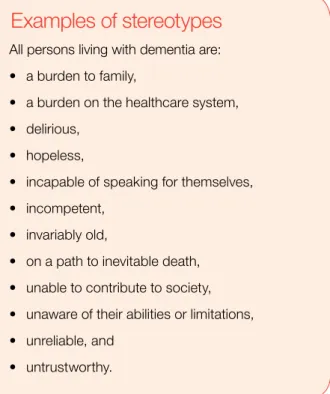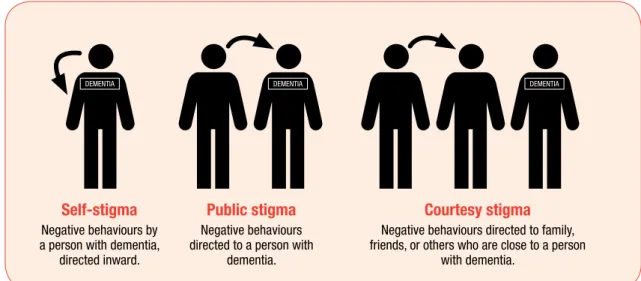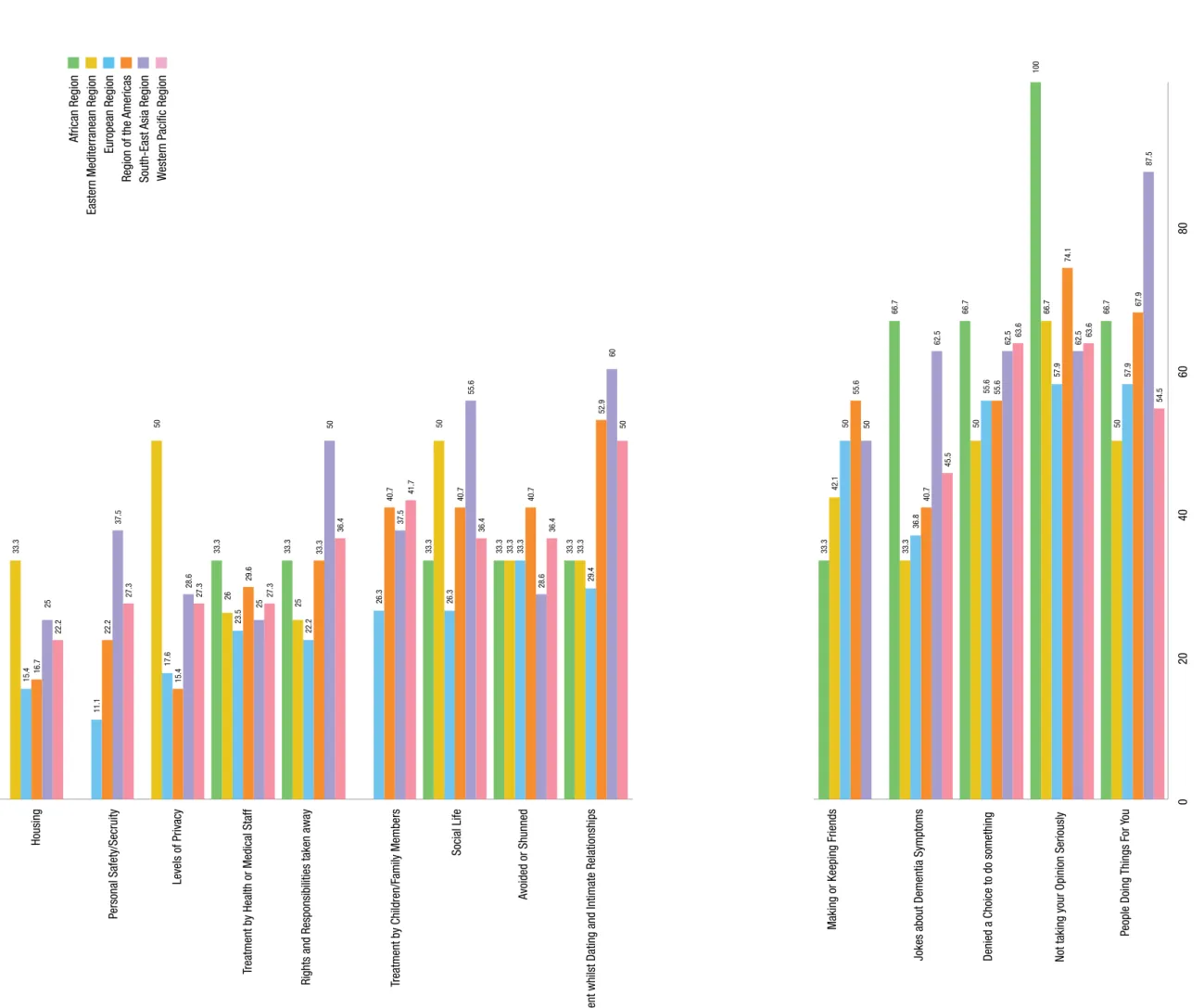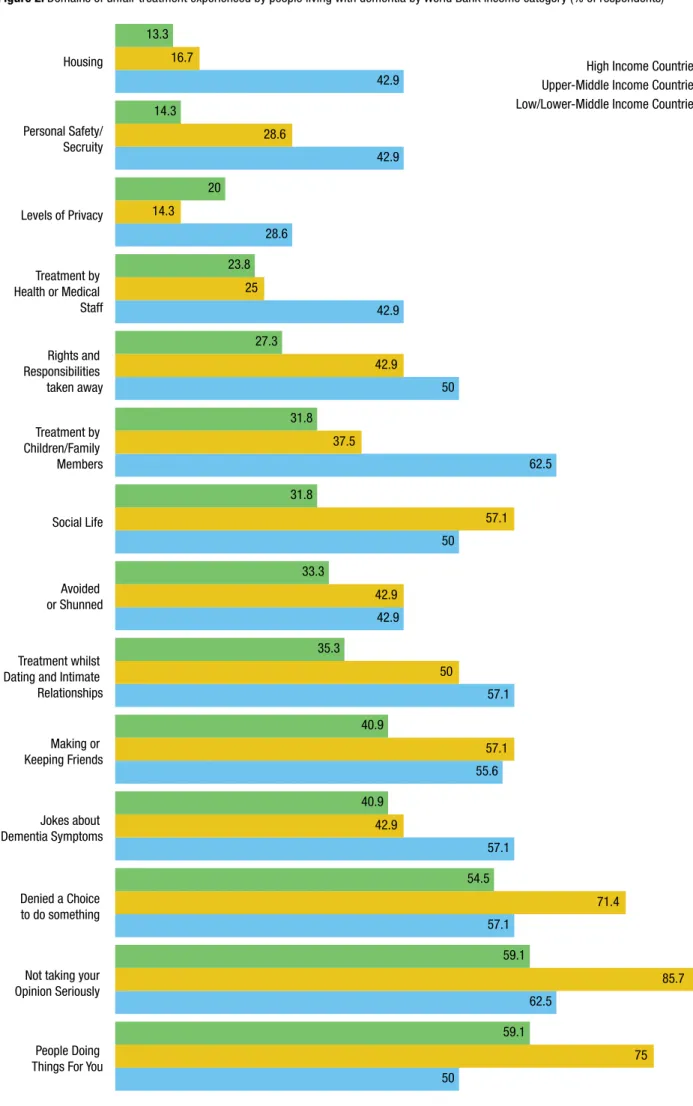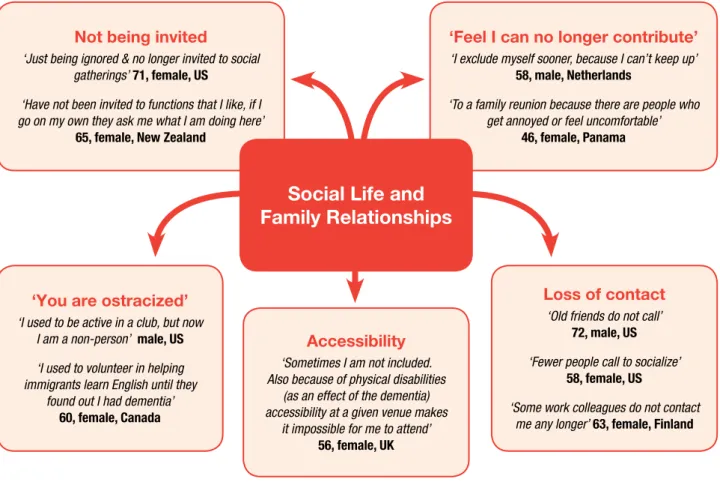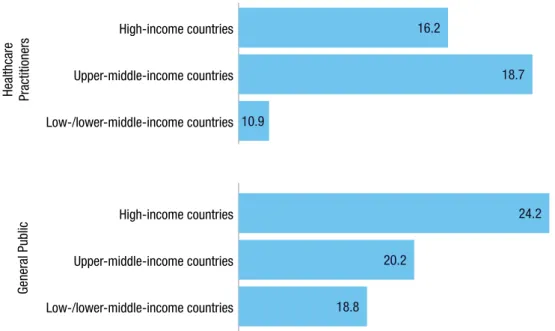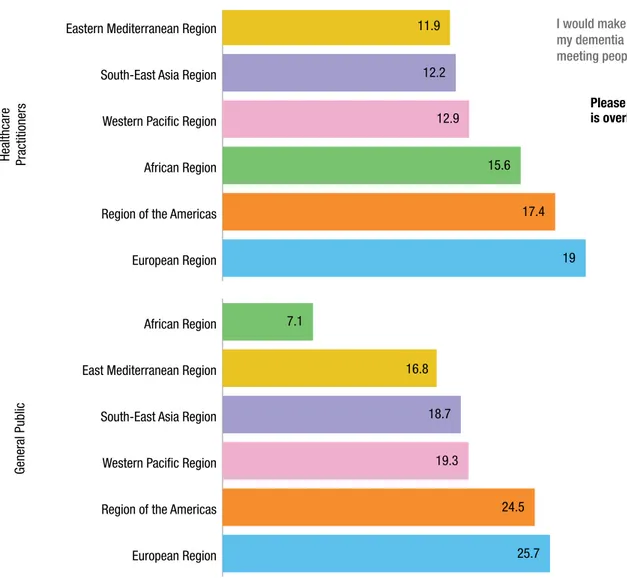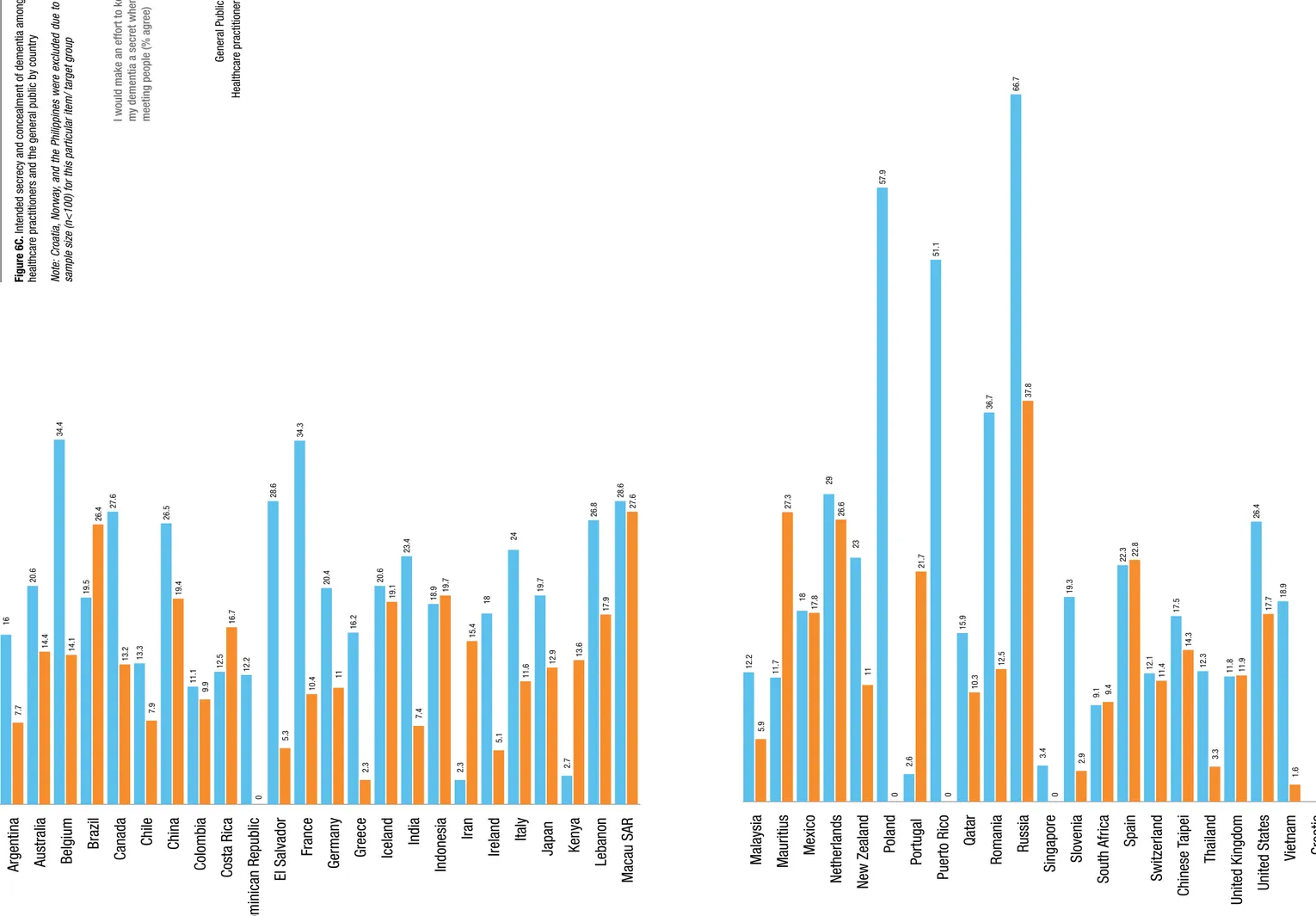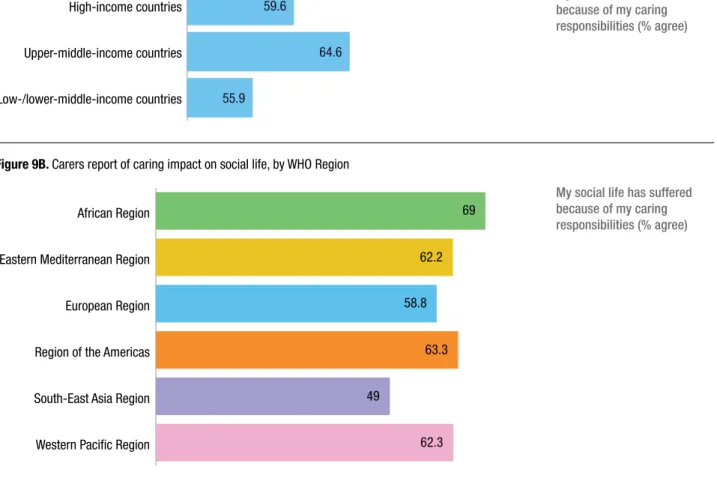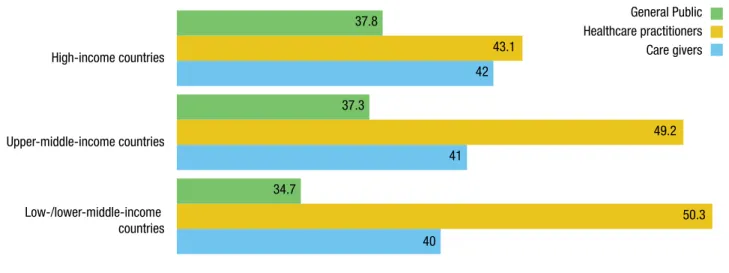World Alzheimer Report 2019
Attitudes to dementia
Author: Alzheimer’s Disease International Contributors:
We would like to thank the large number of contributors involved in this world report, including the survey translators, from 32 countries, without whom this would not have been possible.
The views expressed in the essays, case studies and programmes to reduce stigma are those of the authors.
Attitudes to dementia survey: London School of Economics and Political Science: Dr Sara Evans-Lacko, Jem Bhatt, Asst Professor Adelina Comas-Herrera, Dr Francesco D’Amico, Dr Nicolas Farina, Sophie Gaber, Prof Martin Knapp, Maximilian Salcher-Konrad, Madeleine Stevens, Emma Wilson.
Expert essays, case studies, and programmes to reduce stigma: (Alphabetical order)
Dementia Australia Dr Wendy Grosvenor Prof David Ndetei
Sue Baker Birgit Heuchemer Prof John Oetzel
Prof Sube Banerjee Jayme Hill Dr Deborah Oliveira
Dr Linda Barclay Berrie Holtzhausen Prof JB Orange
Dr Anna Brorsson Prof Kristen Jacklin Guadalupe Ponce Ozuna
Dr Zoe Cashin Shiva Krishnamurthy Jim Pearson
Su-Yuan Chan Pippa Kelly Silvia Perel-Levin
Asst Prof Adelina Comas-Herrera Maryna Lehmann Dr Jaewon Phee
Olivier Constant Asst Prof Christopher Lind Karen Pitawanakwat
Prof Colm Cunningham Christine Maddocks Mario Possenti
Dr Stephanie Daley Victor Madrigal-Borloz Rangimahora Reddy
Walter Dawson Dr Fabiana da Mata Glenn Rees
Dr Nicolas Farina Prof Elaine Mateus Prof Nicolas Rüsch
Rosa Ma Farrés Dr Etuini Ma’u Dr Hamed Al Sinawi
Prof Cleusa Ferri Andre Mauritz DY Suharya
Sophie N. Gaber Pare Meha Ruth Stone
Nouha Ben Gaied Sarah-Jane Meyer Kate Swaffer
Dr Serge Gauthier Princess Nouf bint Muhammad LiYu Tang
Dale Goldhawk María Cecilia López Murga Sarah Tilsed
Howard Gordon Dr Christine Musyimi Lawrence H Yang
Dr Nori Graham Elizabeth Mutunga Jessica Young
Translators: (Alphabetical order) ARDSI (Alzheimer’s and Related
disorders Society of India) Nancy Kalaba Thankane Raditapole
Alzheimer’s South Africa Joost Martens Narendhar Ramasamy
Muriel Rason Andriamaro Prof Elaine Mateus Isabelle Salameh
Bulga Bulganchimeg Nilanjana Maulik Susanna Saxl
Susanne van den Buuse Elizabeth Mutunga Alexandra Shchetkina
Sophie Gaber Tuan Nguyen Dr Hamed AL Sinawi
Konstantinos Gkikas Meera Pattabiraman LiYu Tang
Major Gopalakrishnan Katarzyna Pogorzelska Petra du Toit
Stefania Ilinca Mario Possenti Huali Wang
Sebastien Kabacinski Anastasia Psoma Noriyo Washizu
Faraneh Kaboli Aditya Putra Peach Wattana
Jackie Wong
Published by Alzheimer’s Disease International (ADI), London.
September 2019.
Copyright © Alzheimer’s Disease International Suggested citation:
Alzheimer’s Disease International. 2019. World Alzheimer Report 2019:
Attitudes to dementia. London: Alzheimer’s Disease International.
Design: David O’Connor – www.daviddesigns.co.uk
Due to the diverse nature and number of contributors to this report several key phrases are used interchangeably, including:
Carers / caregivers / care providers / care partners
Healthcare practitioners / healthcare providers / healthcare professionals
World Alzheimer Report 2019
Attitudes to dementia
ADI would like to thank our corporate partners and donors:
Anonymous Foundation
Helen Daniels Bader Fund, A Bader Philanthropy Biogen
Boehringer-Ingelheim Janssen
Lundbeck International Neuroscience Foundation Roche
Otsuka America Pharmaceutical, Inc.
Mary Oakley Foundation
The Van Otterloo Family Foundation
Partners & donors
5
ATTITUDES TO DEMENTIA
Contents
Survey infographic 8
Foreword 10
Executive summary 13
CHAPTER 1
What is stigma? 17
CHAPTER 2:
Attitudes to dementia survey results 21 Appendix 1: WHO Regions map and World Bank Income Groups 2019-2020 66 Appendix 2: Forest plots for country comparisons 70 CHAPTER 3
Expert essays
3.1 Stigma: a personal view 7 years on. Dr Nori Graham. Honorary Vice President of ADI and a Vice President of the Alzheimer’s Society (England), previous chair of each organisation; Honorary Fellow of the Royal College of Psychiatrists and Emeritus Consultant in the Psychiatry of Old Age at the Royal Free Hospital; honorary doctorate public services to the Open University. 88 3.2 Stigma, dementia and age. Silvia Perel-Levin, International Longevity Centre
Global Alliance (ILC GA) representative to the UN, Geneva; Chair, Geneva NGO
Committee on Ageing 90
3.3 Thinking more deeply about dementia friendliness. Dr Linda Barclay, Philosopher at Monash University, Australia specialising in disability and justice and Glenn Rees, Chair, Alzheimer’s Disease International 92 3.4 The role of the media: Help or hinderance? Pippa Kelly, UK. Journalist,
dementia blogger, public speaker 95
3.5 Stigma in 2019; you must be joking! Dale Goldhawk, Vice Chair, Alzheimer’s Disease International & veteran advocacy journalist 97 3.6 Alzheimer’s disease, stigma and disclosure. Prof Nicolas Rüsch, Ulm
University and BKH Günzburg, Germany 98
3.7 The costs of dementia: advocacy, media and stigma. Adelina Comas- Herrera, Assistant Professorial Research Fellow, London School of Economics
and Political Science 100
3.8 Women as carers: gender considerations and stigma in dementia care.
Dr Nicolas Farina, PhD, MSc, BSc, Research Fellow in Dementia, Centre for Dementia Studies, Brighton & Sussex Medical School 102 3.9 “What Matters Most”; Conceptualising cultural aspects of stigma of
Alzheimer’s disease and other dementias. Lawrence H Yang, Department of Social and Behavioral Sciences, New York University; Department of
Epidemiology, Columbia University 104
3.10 Alzheimer’s disease in the lived experience of Lesbian, Gay, Bisexual, Trans and Gender Diverse (LGBT) persons. Victor Madrigal-Borloz.
Senior Visiting Researcher at the Harvard Law School Human Rights Program and United Nations Independent Expert on protection from violence and discrimination based on sexual orientation and gender identity. 106
ALZHEIMER’S DISEASE INTERNATIONAL: WORLD ALZHEIMER REPORT 2019
6
CHAPTER 4
Case studies:
4.1 Stigma and negative attitudes towards people with dementia still pervade: the importance of working together Kate Swaffer, Chair, CEO and co-founder Dementia Alliance International 108 4.2 A young person makes a difference - but have things changed?
Dr Walter Dawson, Atlantic Fellow for Equity in Brain Health at Global Brain Health Institute, University of California, San Francisco 110 4.3 The circle of life; Indigenous knowledge about dementia in Canada. Prof
Kristen Jacklin, Ph.D, Professor, Medical Anthropology, University of Minnesota Medical School Duluth, Karen Pitawanakwat, a member of the Wikwemikong Unceded Reserve, Onatario, Canada, Registered Nurse and Community Researcher for Naandwechige-Gamig, Wikwemikong Health Centre 113 4.4 Dementia discrimination, even by the language we use, a view from
Québec, Canada. Nouha Ben Gaied, PhD, director research and development quality of services Federation of Quebec Alzheimer Societies 115 4.5 Stigma in Brazil: The narrative of a person with young-onset dementia.
Prof Cleusa Ferri, Federal University of Sao Paolo (UNIFESP), Prof Elaine Mateus, Brazilian Federation of Alzheimer’s Associations (FEBRAZ), Dr Deborah Oliveira, UNIFESP, Dr Fabiana da Mata, UNIFESP 116 4.6 Stigma and response to dementia in Guatemala’s indigenous
populations. María Cecilia López Murga, Executive, Association Grupo Ermita,
Alzheimer de Guatemala 117
4.7 From despair to the courage to cope; a carer’s story, Guerruro, Mexico.
Guadalupe Ponce Ozuna, Psychologist and President of the Guerrero Alzheimer Foundation and Rosa Ma Farrés, G.S.Federación Mexicana de Alzheimer y
Enfermedades Similares A.C. 119
4.8 Stigma and dementia care in Kenya; Strengthening Responses to Dementia in Developing Countries (STRiDE) Project. Christine Musyimi, Africa Mental Health Research and Training Foundation (AMHRTF),Elizabeth Mutunga, Alzheimer’s and Dementia Organization Kenya and Prof David Ndetei,
Senior Researcher AMHRTF 121
4.9 The stigma of dementia – a personal story from South Africa. Maryna Lehmann and Andre Mauritz, as told to Sarah-Jane Meyer 123 4.10 Stigma and dementia in sub-Saharan Africa: a Namibian experience.
Berrie Holtzhausen, CEO Alzheimer’s Dementia Namibia 125 4.11 A carer’s perspective: My life with my father Joel Mbithuka Kasimu.
Elizabeth Mutunga, CEO & Founder Alzheimer’s & Dementia Organisation
Kenya 128
4.12 Fighting stigma in the Middle East. Who speaks on behalf of people with Alzheimer’s and dementia? Princess Nouf bint Muhammad, acting CEO
of the King Khalid Foundation 129
4.13 A view from a memory clinic in Oman. Dr Hamed AL Sinawi, Senior Consultant Psychiatrist, SQUH, Chairman, Oman Alzheimer’s Society & Oman
Psychiatry Society 131
4.14 Creating an Alzheimer association; the story of the Alzheimer Indonesia Foundation. DY Suharya, Regional Director, Asia Pacific Alzheimer’s Disease
International 132
4.15 145 Indigenous languages and no word for dementia: use of innovation and technology to help overcome stigma. Dementia Australia 134
7
ATTITUDES TO DEMENTIA
4.16 Māori, Mana and Mate Wareware: Rauawaawa Kaumātua Charitable Trust and its experience in supporting Kaumātua with Dementia.
Rangimahora Reddy & Pare Meha, Rauawaawa Kaumātua Charitable Trust, Dr Etuini Ma’u, Waikato District Health Board, Prof John Oetzel, Uni of Waikato 136 4.17 Federazione Alzheimer Italia – developing a model for Dementia
Friendly Communities. Mario Possenti, Segretario generale,
Federazione Alzheimer Italia 138
4.18 Dementia in prisons; How to address the double stigma of people with dementia or memory issues in prisons and forensic institutions. Sophie N. Gaber, MSc OT, PhD Candidate at Karolinska Institutet, Sweden & Birgit Heuchemer, MSc. reg. OT at HELIX Forensic Psychiatric Clinic of Stockholm;
Research Assistant at Karolinska Institutet, Sweden 140 4.19 Challenging stigma in mental health: What we’ve learnt over 10 years.
Ruth Stone, Global Communications and Digital Manager, and Sue Baker,
Director, Time to Change Global 143
4.20 Advertising & dementia; the power of a cup of tea. Chris Lynch, Deputy CEO & Director of Policy, Communications & Publications, ADI and
Shiva Krishnamurthy, Unilever 145
4.21 Young onset dementia, a personal story; time for change.
Christine Maddocks 146
CHAPTER 5
Programmes to reduce stigma
5.1 Time for Dementia - preparing the future workforce to understand and meet the challenges faced by those with dementia and their families.
Dr Stephanie Daley, Dr Wendy Grosvenor, Christine Maddocks,
Dr Zoe Cashin, Dr Jaewon Phee, Jayme Hill, Prof Sube Banerjee 148 5.2 Dementia research participation; challenging stigma. Howard Gordon.
Dementia Alliance International, 3 Nations Working Group 151 5.3 Hope through dementia research participation. Serge Gauthier MD, C.M.,
C.Q., MD, FRCPC, Director, AD Research Unit, McGill Center for Studies in Aging, Canada, Past Chair of ADI Medical and Scientific Advisory Panel 153 5.4 Scottish working groups: advisors, advocates, influencers.
Jim Pearson, Director of Policy & Research, Alzheimer Scotland 154 5.5 Dementia Advisory Group brings TADA Chinese Taipei to a new era of
human rights. LiYu Tang Secretary General, TADA, Su-Yuan Chan,
Policy Researcher, TADA 156
5.6 Forget dementia, remember the person! Breaking down stigma to move forward towards an inclusive society in Flanders (Belgium).
Olivier Constant, Flanders Centre of Expertise on Dementia 158 5.7 From Seldom Heard to Seen and Heard: why communities should
not be viewed as hard to reach. Sarah Tilsed, Campaigns & Partnerships
Manager, National Dementia Action Alliance 160
5.8 The role of technology around stigma: Marie’s journey. Sophie N.Gaber, MScOT, PhD Candidate at Karolinska Institutet, Sweden & Dr Anna Brorsson, MScOT, Assistant Professor at Karolinska Institutet, Sweden 162 5.9 Can design play a role in increasing awareness and challenging stigma
around dementia? Prof Colm Cunningham, Director, Dementia Centre,
Hammond Care, Australia 164
CHAPTER 6
Conclusion and recommendations 166
ALZHEIMER’S DISEASE INTERNATIONAL: WORLD ALZHEIMER REPORT 2019
8 ATTITUDES TO DEMENTIA 9
ALZHEIMER’S DISEASE INTERNATIONAL: WORLD ALZHEIMER REPORT 2019
10
Foreword
Paola Barbarino, CEO Time to roll our sleeves up (again, and again!)
I cannot express enough pride at being able to introduce this year’s World Alzheimer Report on global attitudes to dementia. This report belongs to all the 70,000 of you who replied to our survey, so first of all, thank you.
When you look back at our international movement, which started in 1984, you see how a group of committed and energetic doctors and of professional and family carers, decided they had had enough of Alzheimer’s being hidden in society and that the time was right to bring the disease to the attention of governments, politicians and the public at large.
Behind the foundation of an International Non-
Governmental Organisation like ADI there is always the feeling that things could be much better and a sense that if we campaign strongly enough, if our voice is loud enough, we will be heard, and things will change.
At times I wonder why we did not start sooner.
Alzheimer’s disease was first described in 1906 but ADI was only founded in 1984. If we look at the Union for International Cancer Control (UICC), which is the equivalent of ADI, that was founded in 1933, about 50 years before us. The UICC is now a multimillion-pound organisation and the driving force behind cancer de- stigmatisation.
We, on the other hand, are running 50 years behind and still have a mountain to climb. In the words of one of our survey respondents:
“Shunned by hundreds in my home town. People would sooner have stage 4 breast cancer than my diagnosis.
(They) couldn’t look me in the eye.”
Today people march together against cancer and support each other through cancer. We all talk about it as the last frontier. We talk of battles and of survivors.
We appropriate a military language which, whilst not quite suitable to the people going through the disease (who can resent the idea of having to fight the inevitable), it certainly works from an awareness raising perspective.
It also gives people a sense that they can be proactive and not just passive victims of the disease.
If society feels that they play a positive role then they will demand a solution. Last year’s World Alzheimer Report1 – which focused on research – stated unequivocally
that for every 12 studies on cancer there is only one on neurocognitive disorders (not just on Alzheimer’s disease!). This is the size of the research gap - but there still isn’t enough funding in Alzheimer’s and dementia research - despite civil society’s collective efforts.
Going back to the genesis of this report, one of my biggest challenges, as I stepped into my role at ADI, was my Board and my members’ desire to see a decrease in stigma and heightened awareness. The thinking was that if we manage to raise awareness, then we will have a more determined grassroots movement. People will understand that Alzheimer’s is a disease, not just old age, and ask their governments to acknowledge that we have a crisis on our hands. This in turn could mean the creation of dedicated services for those going through the disease and for their carers, for better diagnostic and post-diagnostic support, as well as an increased focus on finding a disease-modifying treatment. In short, all the actions described in the World Health Organization (WHO) Global action plan on dementia2, which we fought so hard for but that is so difficult to implement.
ADI already runs World Alzheimer’s Day and Month awareness campaigns, which get a lot of traction in the public and in the press, and it publishes the World Alzheimer Report, which is possibly the most quoted and trusted source of information on Alzheimer’s and dementia globally. But, for all this output, there isn’t a corresponding measurement that can tell us how well we are doing at changing attitudes to dementia, and not just globally but nationally and locally.
In Alzheimer’s and dementia there has undoubtedly been a great increase in awareness in higher income countries - certainly in the last 10 years - pretty much since ADI promoted the global figures on prevalence and incidence of the disease for the first time3-4. However, in low- and middle- income countries there are still reports of stigma felt by people with dementia and by carers – I need only recount the appalling stories of physical restriction and murder in Africa, as reported by our members there.
Even in high income countries (and this really comes into sharp focus in the survey) the general public, healthcare professionals, our members and other advocacy organisations report widespread shortages of services as well as noticeable differences in service provision between rural areas and urban areas. Also, despite high- profile awareness campaigns people still delay seeking out help, advice and support when they first start to worry about their memory or that of a family member. If this was a physical or visible ailment, how much more quickly would people react?
Back in 2018 however, our problem was that because much of this evidence was anecdotal, we did not know
11
ATTITUDES TO DEMENTIA
how we could measure whether these issues were sporadic or consistent throughout the world, or peculiar to a particular region; whether some issues were real for everyone or just perceptions; and, crucially, whether anything was getting better as a result of our advocacy efforts.
This report was borne out of a resounding need to establish a strong baseline so we could start measuring whether we really are doing better and making a difference once and for all. But we did not want to focus just on those countries where there are resources and means of taking action. In the spirit of solidarity and love that is the bedrock of ADI, we wanted to know more about those countries where there is little or nothing.
A prior survey on stigma by ADI in 20125 had 2,500 participants. A laudable effort (and a first) but statistically a very low sample to consider it as a strong baseline for global attitudes. Looking at other diseases and how they had addressed stigma was also interesting and frankly a bit disheartening. I remember some of my early conversations about HIV/AIDS and cancer with professionals who had been working in those areas at the time of greatest stigma, and almost everyone pointed out that the real change in attitudes (both from the point of view of people seeking a diagnosis and from the point of view of the general public acknowledging the disease) had happened when a drug-based treatment and a cure started appearing on the horizon. Well, we still don’t have a cure and have had no treatment breakthrough for almost 20 years for Alzheimer’s and dementia. We are yet to have that light at the end of the tunnel, but this is not a good reason to let go and do nothing.
As the Dementia Friendly Community6-7 movement has demonstrated, time and time again, there is so much we can do to make life for those who have dementia and their carers immensely better by making them feel supported, loved and understood by our society and wherever possible by empowering them in every aspect of dementia activity, including advocacy. This makes a marked contrast to feeling shunned, hidden or ashamed, as in the quote above.
Indeed, the word love is something that comes out strongly from one of this report’s essays, the one focusing on Canada’s First Nation’s attitudes to dementia:
“… Reminds us that the person with dementia, who is being cared for, is in need of a lot of love. He urges the use of ‘loved one’ to refer to the person with dementia so that we remember that they are loved. He shared that using the words ‘loved one’ serves as a reminder of how care providers should be treating and respecting the person with dementia”.
Ironically, and sadly, the enormous swelling of population with the disease is on our side. When people ask me what I do for a living, and we start a conversation, it’s rare they don’t have a case in the family, wherever I am in the world.
When we commissioned this ambitious survey, we asked several universities and I am delighted that the London School of Economics and Political Science (LSE) was enthusiastic to pick up the gauntlet. They share our vision and our passion and as the numbers for our survey went up and up, there was a shared sense of joy undeterred by the enormity of the analytical task ahead.
I should not underestimate the size of the challenge faced by ADI and its members and partners in distributing the survey globally to so many different audiences. Nobody had ever attempted such a large survey in this field, and we were not sure whether we would have the capacity to mobilise our network to a whole new level.
A smidgen under 70,000 people later we can say that we certainly did! But it did take a huge amount of work on the part of everyone involved and I would particularly like to thank Australia, Brazil, Canada, China, India, Indonesia, Italy, Mexico, the Netherlands, New Zealand, TADA Chinese Taipei, Vietnam, the UK and USA who really went for it and helped us drive the numbers up globally. This survey, and its dataset, will now form part of the freely available shared resources we can use from now on to measure our performance on attitudes and hopefully make stigma a thing of the past – in all countries. It is our intention to repeat this research process after 5 years.
I know if you have picked this up that you will read the report in detail and I don’t want to pre-empt it, but I leave you with a few thoughts.
• Almost 80% of the general public are concerned about developing dementia at some point and 1 in 4 people think that there is nothing we can do to prevent dementia. Clearly the messages on the importance of risk reduction highlighted recently by a WHO report are not getting through.8 People don’t know what to do. We need to do more to spread this message at every level.
• 35% of carers across the world said that they have hidden the diagnosis of dementia of a family member from at least 1 person. Our next target will be to get to 0%.
• 75% carers globally say “I am often
stressed between caring and meeting other responsibilities” even whilst expressing positive sentiments about their role and over 50% of carers said their health suffered as a result of their caring responsibilities. Are we doing enough for carers? Obviously not. Help and support for carers should be a fundamental lynchpin of any national dementia plan and we will continue to advocate towards it and empower our members to do so at national level. In the report it is clear that even in high income countries, most categories of survey respondents felt there were not enough services available.
ALZHEIMER’S DISEASE INTERNATIONAL: WORLD ALZHEIMER REPORT 2019
12
• Health Care Professionals in lower income countries were most positive about their willingness to work with a colleague with dementia. However, the public (most of whom will not work in a health setting) were least willing to work with a colleague with dementia.
We need to change that, and we will work in the next few years both on the issue of the rights for carers in the workplace and the issue of disability rights for people living with dementia.
• Almost 62% of healthcare providers worldwide think that dementia is part of normal aging. Our message that dementia is NOT part of normal aging but a disease, is loud and clear, but is clearly not getting through. We must work much harder at this with all our members.
• I see a worrying trend developing with 36% of all respondents saying they would seek help on the internet. There is so much unreliable information over the web, and it is an area with exponential growth, so we do need to be proactive and create trusted repositories of real information. We give the example with our website where all resources are freely available and so do our members.
• And last but not least around 40% of the general public think doctors and nurses ignore people with dementia – time for primary healthcare practitioners to look closely at their practice and for governments to increase dementia training.
In the enthusiasm to include the views and voices of the people with dementia we must never forget the family carers. This extract of the Mexican essay is a sobering reminder of that:
“After about ten days I made the decision that I was going to take my husband who has dementia to the federal highway and I was going to throw myself under the wheels of a trailer, the biggest one I saw pass by, together with my husband, because I was not going to be able to bear everything that was coming. I woke up that day very early with my decision taken, to clean the house and leave everything ready, so they could hold vigil over us afterwards that day.”
It is a relief that the person in this stark story lived to tell the tale, but these stories are happening all over the world and we must do something to stop this. It is terrible that a human being should contemplate suicide because they cannot cope caring for another human being by themselves. Respite and care must be made available globally, it is a matter of social justice.
As you have gathered from above, alongside the survey results you will read expert essays and case studies that highlight the scope and scale of the global challenge and the often spirited and galvanising response from people, like us, trying to affect change. Amongst many topics we look at:
• the double stigma attached to both age and dementia
• the challenges experienced by some indigenous populations around the world
• stigma in marginalised or lesser heard from communities including prison settings, people with learning disabilities and the LGBTQ community
• the media’s role in helping raise awareness or exacerbating stigma
• the history and influence of working groups of people living with dementia and carers
• a philosophical question about the introduction and evolution of dementia friendly communities
I would like to thank the founders of ADI and the hundreds of thousands of you who work so hard day in day out on all aspects of the disease. You are doing so much, but we need to do more. This is just the beginning.
Ultimately, reality is not what governments tell us it is, it is not what experts like us tell us it is; reality is what people on the ground are feeling. Reality is what people feel every morning when they wake up and every night when they go to sleep. We must never forget that, and this is why this World Alzheimer Report is for all of you.
References
1 Patterson, C. 2018. World Alzheimer Report 2018: The state of the art of dementia research; New frontiers. London: Alzheimer’s Disease International.
2 World Health Organization. Global action plan on the public health response to dementia 2017–2025. Geneva: World Health Organization; 2017. Licence: CC BY-NC-SA 3.0. online: <https://
apps.who.int/iris/bitstream/handle/10665/259615/9789241513487- eng.pdf?sequence=1> Last accessed 20 August 2019.
3 Alzheimer’s Disease International. 2009. World Alzheimer Report 2009: The Global Prevalence of Dementia. London: Alzheimer’s Disease International.
4 Prince, M., Wimo, Guerchet, M., Ali, , G-C, Wu, Y-T., Prina, M. 2015.
World Alzheimer Report 2015: The Global Impact of Dementia.
An Analysis of Prevalence, Incidence, Cost and Trends. London.
Alzheimer’s Disease International.
5 Batsch, N. L., Mittelman, M. S. 2012. World Alzheimer Report 2012:
Overcoming the Stigma of Dementia. London: Alzheimer’s Disease International.
6 Alzheimer’s Disease International. 2016. Dementia Friendly Communities: Key Principals (1st Edition) online: <https://www.alz.
co.uk/dementia-friendly-communities/principles> Last accessed 20 August 2019.
7 Alzheimer’s Disease International. 2017. Dementia Friendly Communities: Global developments (2nd Edition) online: <https://
www.alz.co.uk/adi/pdf/dfc-developments.pdf> Last accessed 19 August 2019.
8 World Health Organisation 2019. Risk reduction of cognitive decline and dementia: WHO guidelines. Geneva: World Health Organization;
2019.
13
ATTITUDES TO DEMENTIA
Executive summary
In 2019 ADI estimates that there are over 50 million people living with dementia globally, a figure set to increase to 152 million by 2050. Someone develops dementia every three seconds and the current annual cost of dementia is estimated at US $1trillion, a figure set to double by 2030.
In the World Alzheimer Report 2012 ‘Overcoming the stigma of dementia’ we explored the nature of dementia related stigma. The core of the report focussed on the results of a survey of 2,500 people; people living with dementia and carers, in a limited number of countries around the world. The report helped define dementia related stigma and offered recommendations to tackle it, alongside a series of case studies and practices aimed at stigma reduction.
In this 2019 World Alzheimer Report, we revisit attitudes to dementia and stigma to better understand the role they play and to set a baseline against which we can gauge future changes. This report details the scale of the challenge we face where attitudes to dementia, and specifically stigma, are still a major barrier to people seeking out information, help, advice, support and even a diagnosis; preventing or delaying people from putting plans in place; progressing to a stage of acceptance and being able to adjust to live with dementia. Stigma may be overt; in some countries it is still associated with witchcraft resulting in people being restrained and isolated. Or it can be more subtle; even in countries
with national dementia plans and profile awareness campaigns, many people still delay seeking help when they first become aware that something is wrong.
The 2019 World Report:
At the core of the 2019 report are the results of a global survey, commissioned by ADI and undertaken by the London School of Economics and Political Science (LSE). Almost 70,000 people globally engaged with the survey, making it the biggest of its kind ever undertaken.
LSE developed the survey to target four key groups, (1) people living with dementia, (2) carers, (3) healthcare practitioners and (4) the general public, with analysis being provided in three categories: knowledge, attitudes and behaviour. In the survey analysis we highlight the behavioural element first, giving prominence to the voices and experiences of people living with dementia as direct assessment of actual behaviour is central to discrimination and is the closest representation of the true impact of stigma on people living with dementia.
The report also poses the question “what is stigma?”, looking to define dementia related stigma and to better understand the component parts based on power, stereotypes, prejudice and discrimination. Then, through a series of expert essays, case studies and programmes, the report sheds light on the nature and complexity of attitudes and stigma; it looks to other sectors for
ALZHEIMER’S DISEASE INTERNATIONAL: WORLD ALZHEIMER REPORT 2019
14
guidance and inspiration; showcases examples of the different challenges and responses at global, regional, national and local levels; and offers some examples of programmes developed to improve awareness and to tackle stigma.
Key findings
Two years into the WHO Global action plan on dementia, 35 years into the life of ADI, and longer for many
associations around the world, should we be surprised at these findings? There is evidently underlying fear in global populations about developing dementia - 78%
expressing concern – and some media portraying dementia as the most feared illness. Journalist Pippa Kelly, in this report, articulates that “Stigma stems from fear. Fear breeds silence, which in turn perpetuates ignorance and misunderstanding”.
A key reason for developing this survey and establishing a baseline for future review is to help us understand the scale of the challenge in informing and educating the 2/3rds of people who still think that dementia is a normal part of ageing, rather than a neurodegenerative disease and a leading cause of death; in some countries the leading cause of death.
Perhaps an even bigger challenge, and more worrying, is the staggering 62% of healthcare practitioners that think dementia is a normal part of ageing.
With an increasing focus on risk reduction research and messaging, and in the continued absence of a disease modifying treatment, we now have a clear understanding of how important people think that lifestyle factors are.
The stark finding of this survey reveals that currently just over 50% of people think that lifestyle factors are influential. These figures form a baseline from which we can measure the impact of future global risk reduction efforts.
We wanted to better understand the stigma and discrimination experienced by people living with dementia, and particularly, what kinds of treatment they felt were unfair and the outcomes associated with these negative experiences. Unfair treatment can be experienced in many ways – at home, in the community, even in healthcare settings – and include things like being denied choice, being ignored, unfair treatment in dating and intimate relationships, lack of privacy, joking about dementia, and of particular interest, inappropriate treatment by healthcare practitioners.
Respondents reported feeling “avoided”, “ignored” and
“ostracized” in their social life due to having dementia where many of them “no longer get invited to social gatherings”. Poignantly, one respondent captures this with:
“I call it the friendship divorce. I have lost a fair amount of people in my life that at one time considered friends”.
Half of the respondents living with dementia from lower-middle income countries reported that they had experienced their rights or responsibilities taken away from them unfairly.
Knowledge
• 95% of the public think they will develop dementia in their lifetime
• 78% are concerned about developing dementia at some point
• 1 in 4 people think that there is nothing you can do about dementia
• 2 out of 3 think dementia is caused by normal ageing
• 62% of healthcare practitioners think that dementia is a normal part of ageing
• 82% of people would take a genetic test to learn about their risk
• 54% of respondents think that lifestyle factors play a part in developing dementia
• Just under 40% of the general public think that there are adequate community services for people living with dementia and for carers
• Just under 70% of the general public think there are adequate competent physicians for
the diagnosis and treatment of dementia
Behaviour
• Over 85% of respondents living with dementia stated that their opinion had not been taken seriously
• Around 40% of the general public think doctors and nurses ignore people with dementia
• 67% of people living with dementia in Africa, and 63% in South East Asia, said their dementia symptoms were joked about by others
• Between 35% in high income countries and 57% in low-middle income countries reported being treated unfairly in dating and intimate relationships
• Around 30% of people in Europe are willing to have a person with dementia move in with them, rising to 62% in South East Asia and 71%
in the Eastern Mediterranean region
15
ATTITUDES TO DEMENTIA
Over 85% of respondents living with dementia stated that their opinion had not been taken seriously. One respondent reported being told “your opinion no longer matters”.
Unfair treatment by health or medical staff is an area of concern, as are the attitudes of some healthcare practitioners – with around 40% of the general public thinking doctors and nurses ignore people with dementia. “My neurologist ignored my presence when my diagnosis was discussed with my husband”.
Joking and humour around dementia is a very sensitive subject. Respondents in the African region (66.7%) and South-East Asia (62.5%) reported the highest prevalence of their dementia being joked about. However, this is a tricky area, humour can be therapeutic, but it is often permission based. The challenge is evidently how difficult it is to judge appropriateness. “It is 100% offensive and inexcusable to joke about my symptoms, unless it is me joking about it!”
Dating and intimate relationships are another sensitive area. Respondents with dementia reported unfair treatment in relationships, the highest figures in low / lower middle-income countries (57.1%) and upper- middle countries (50%). “To be honest, NO ONE wants to date a 58-year old guy with Alzheimer’s”.
A very high proportion believe that people should not hide the fact that they have dementia, supported by
a high number of people (80%) agreeing that people with dementia can participate in a variety of activities.
Attitudes to concealment, however, varied regionally – in Europe and the Americas around 25% saying they would keep their dementia a secret, with Healthcare practitioners also reporting higher levels of concealment in Europe (19%) and the Americas (17.4%).
Concealment and secrecy are key examples of stigma surrounding dementia and some specific country level figures warrant attention – with people in Russia (66.7%), Poland (57.9%), Puerto Rico (51.1%) saying they would hide their dementia when meeting people.
In relation to attitudes and views around danger 45% of people living in South-East Asia, and 48% of healthcare practitioners, think that people with dementia are dangerous, however, this is interesting considering relatively high proportions of people living in the South- East Asia region are willing to have a family member living with dementia to move in with them.
Around 60% of people felt it was important to remove responsibilities of people living with dementia which is interesting in the context that many of the experiences of discrimination reported by people living with dementia pertain to loss of status and loss of roles.
Around 40% of the general public think that healthcare practitioners (physicians and nurses) ignore people with dementia (38% in high-income, 49% in upper- middle income and 32.5% in low/lower middle-income countries).
Ironically, respondents had a vastly more negative opinion of the behaviours of others than about their own behaviour. Both healthcare practitioners and the general public believe that other people are likely to engage in stigmatising behaviours.
Although just over half of carers expressed positive sentiments about their caring role, and found it fulfilling, 52% of carers said their health, 49% their work and 62% their social life suffered because of their caring responsibilities. This raises key questions about formal support services for carers and brings into perspective the importance of a resilient response to action area 5 of
Attitudes
• 91% of respondents say that people should not hide the fact they have dementia and the vast majority of carers never hide the person with dementia
• However, around 20% of respondents would keep their own dementia a secret when meeting people
• Concealment of dementia varied regionally - with the general public in Europe (25.7%) and the Americas (24.5%) reporting they would keep their dementia a secret. Healthcare practitioners also reported higher levels of concealment in Europe (19%) and the Americas (17.4%)
• Respondents stating they would hide their dementia when meeting people was highest in Russia (66.7%), Poland (57.9%), and Puerto Rico (51.1%),
• 45% of people living in South-East Asia and 48% of healthcare practitioners in the region feel that people with dementia are dangerous.
• 60% of people felt it was important to remove responsibilities of people living with dementia
Carers
• Majority of carers expressed positive sentiments about their caring role
• 52% of carers said their health had suffered
• 49% of carers said their work had suffered
• 62% of carers said their social life had suffered
• Over 35% of carers globally have hidden the diagnosis of a person with dementia
ALZHEIMER’S DISEASE INTERNATIONAL: WORLD ALZHEIMER REPORT 2019
16
the WHO Global action plan on dementia. Attitudes to caring vary by region, by socio-economic grouping and by culture and expectation.
The extent to which work is affected by the provision of care may be influenced not only by the amount of care that is provided and the support available to the carers, but also by differences in the propensity for women (who are most likely to be carers) and older people to work, and by policies to support the employment of people with caring responsibilities.
Recommendations
Stigma and knowledge issues around dementia are evidently still major barriers, not only to people seeking out more information, advice, support and a diagnosis but also in the basic understanding of Alzheimer’s disease and related dementias as a medical conditions, that require treatment, support, even rehabilitation. By default, stigma thus also impacts negatively on research and research participation as we strive for a disease modifying treatment breakthrough.
Therefore, it is essential to take action, to improve awareness, to help dispel lingering myths around dementia and ultimately aim to reduce or even eradicate stigma.
Recommendations
1 Targeted public health awareness campaigns 2 Promotion of timely diagnosis and better post
diagnostic support
3 Global evolution of dementia friends programmes and dementia friendly/inclusive communities - with people living with dementia and carers at the heart of their design,
implementation and evaluation
4 Increased public advocacy of people living with dementia – amplifying the voice of lived experience
5 Increase advocacy focused on carers experiences – whilst improving the understanding of first-hand experience 6 Specialised education about dementia-related
stigma and person-centred care practice for healthcare practitioners
7 Call for local governments to increase the funding, range and quality of community services for people living with dementia 8 Changes to public policy relating to
employment, health and insurance for both people living with dementia and their carers 9 Full adoption of a rights-based approach
to dementia including full compliance with the Convention of Rights of Persons with Disabilities (CRPD)
10 Increase funded research – for both a disease-modifying drug as well as further understanding of stigma. We know from other high stigma illnesses, including cancer and HIV- AIDS, that medical treatment breakthroughs can be a catalyst to stigma reduction – and we also need to better understand the complex role stigma plays throughout society in order to tackle it and change hearts and minds.
17
ATTITUDES TO DEMENTIA
CHAPTER 1
What is stigma?
Contributors: Jessica Young, Flinders University and Western University, Professor JB Orange, Western University, and Associate Professor Christopher Lind, Flinders University
“Diagnosis has changed our world forever. Our lives be- come limited by the stigma we face in the world around us. It’s like we have a target painted on our foreheads shouting out ‘dementing’ for all the world to see. People become awkward in our presence, are unsure of our behaviour, and our world becomes circumscribed by the stigma of our illness”. Christine Bryden, Dementia Activist1
For persons living with dementia, full and equitable engagement in everyday life activities often is
compromised by the stigma associated with dementia2&3. But what is stigma exactly? Here we introduce the concept of stigma and describe its relationship to the concepts of ‘stereotype’, ‘prejudice’, ‘discrimination’
and ‘power’. We provide context for later discussions of stigma in this report and form a foundation for initial recommendations to reduce dementia-related stigma.
The word ‘stigma’ originates from Greek language, meaning a ‘mark’ or ‘brand’. In the social sciences, the term ‘stigma’ refers to marked differences from what is
‘normal’ for a group of people, and to negative emotional and/or behavioural responses to those differences.
Sociologist Erving Goffman4 has been influential in our understanding of stigma as a social phenomenon.
Goffman described stigma as the marginalisation of persons in response to traits they exhibit, such as ethnicity, religious beliefs, physical disability, skin scarring, or ‘weaknesses’ of character (e.g., represented by imprisonment or addiction). He showed how being
‘marked’ with any of these traits could have negative consequences in a given social context.
Four key components
Contemporary stigma research adds clarity to our understanding of what stigma is, what outcomes it creates, and who it affects. This research advances our understanding of how people labelled as somehow abnormal (i.e., those being stigmatised) experience their everyday lives. Recently, researchers, clinicians, policy makers, care providers and persons living with dementia have used the concept of stigma to explain how dementia often is seen as a socially undesired trait, leading to discrimination, social isolation, and disenfranchisement.
There are many contemporary models of stigma5-7. One model8, which has proven particularly useful in understanding dementia-related stigma9-11, identifies four critical components essential for stigma to have its
effect: power, stereotypes, prejudice, and discrimination.
‘Stigma’ is said to occur when persons with relative social, economic, or political power internalise generalised negative beliefs (stereotypes) which then manifest as negative emotional responses (prejudice) and negative behavioural responses (discrimination).
Below we describe each component in greater detail and consider how each contributes to dementia-related stigma.
Component 1: Power
Stigma is dependent on social, economic, or political power8. The type and severity of stigma can differ depending on who holds relative power over another7. For example, persons living with dementia may form stereotypes of medical professionals, yet often lack the power to discriminate against them (e.g., they may lack the social, economic or political resources required to exclude that individual from decision-making about their care).
Component 2: Stereotypes
Stereotypes refer to the generalised beliefs, often negative, about what it means to have a certain trait.
According to common dementia stereotypes, having dementia is an inherently negative experience (see Figure
Examples of stereotypes
All persons living with dementia are:
• a burden to family,
• a burden on the healthcare system,
• delirious,
• hopeless,
• incapable of speaking for themselves,
• incompetent,
• invariably old,
• on a path to inevitable death,
• unable to contribute to society,
• unaware of their abilities or limitations,
• unreliable, and
• untrustworthy.
Figure 1. Dementia-related stereotypes 13-18
ALZHEIMER’S DISEASE INTERNATIONAL: WORLD ALZHEIMER REPORT 2019
18
1). Stereotypes are powerful because they are created and perpetuated in many different ways11. They:
1 are perpetuated through the language used to talk about persons living with dementia (e.g., by referring to them as “‘demented’ ‘sufferers’, ‘subjects’,
‘victims’, and ‘not all there’”12);
2 are perpetuated through the prevailing medical model of dementia, which portrays dementia as an inexorable decline in all aspects of human functioning including loss of personhood and self;
3 are compounded with other stereotypes (such as stereotypes about older adults or about persons who are institutionalised); and
4 are shaped by cultural beliefs about the cause of dementia (e.g., karma, lack of religious or spiritual adherence).
Component 3: Prejudice
Prejudice refers to the uptake of stereotypes and negative emotional reactions to those stereotypes.
Adopting these stereotypes often is subconscious but can have real, significant impacts on our emotions and behaviours. Within the context of dementia, negative emotional reactions most often include fear, shame, revulsion or disgust19-21. The severity of prejudice is shaped by age, gender, profession, ethnicity, culture and understandings of dementia prognosis, among other factors22.
Component 4: Discrimination
Discrimination refers to negative behavioural responses to prejudice8. These responses include behaviours such as avoiding, ignoring, or actively excluding persons living with dementia. At the most extreme, discrimination may result in the denial of basic human rights including, for example: the choice of where to live, deciding what and when to eat, and access to medical care.
Who does stigma affect?
It is important to note that: (1) both persons with dementia and persons without dementia can exhibit discriminatory behaviours, and (2) discriminatory behaviours can be directed toward the person living with dementia or to persons close to them. To demonstrate these two points, a useful distinction can be drawn among three types of stigma: self-stigma, public stigma, and courtesy stigma (See Figure 2).
In the context of self-stigma, stereotypes and prejudice may lead to discrimination of persons living with
dementia, with many possible negative outcomes. These include a person living with dementia being reluctant to seek help, presenting late to health services, disbelieving the diagnosis, and/or social isolation caused by
avoidance of, or total withdrawal from, interactions with others2,24,16.
In the context of public stigma, persons living with dementia may experience discrimination in the form of: loss of quality social interactions, social roles, and relationships; exclusion from decision-making; delayed or withheld disclosure of dementia diagnosis25,26; and limited or delayed referral to dementia-appropriate services or treatment27,28.
In the context of courtesy stigma, also known as
‘stigma by association’, stereotypes and prejudice lead to discrimination of persons close to an individual with dementia29. Courtesy stigma is expressed in the form of social isolation or exclusion of family members or friends of persons living with dementia13,30, or by staring at or by talking about formal caregivers and friends behind their backs31, for example.
Reducing stigma
There are many approaches to reducing dementia- related stigma, but limited evidence for or consensus about which are the most effective22,23. To date, the most promising approaches to reducing stigma include:
Figure 2. Three types of stigma 2,23
DEMENTIA DEMENTIA DEMENTIA
Self-stigma
Negative behaviours by a person with dementia,
directed inward.
Public stigma
Negative behaviours directed to a person with
dementia.
Courtesy stigma
Negative behaviours directed to family, friends, or others who are close to a person
with dementia.
